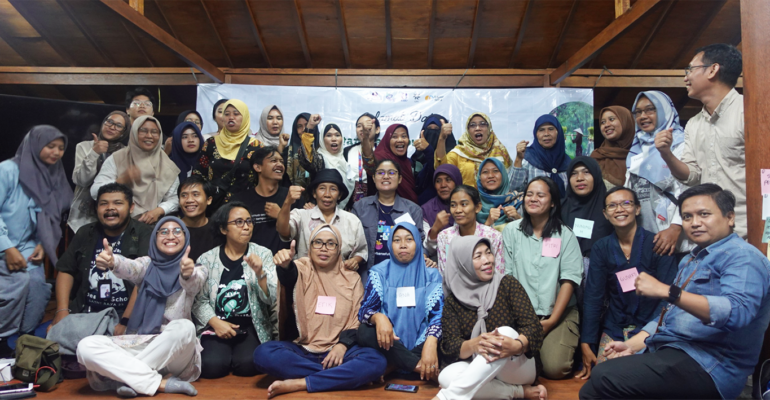TNC IPB University Supports Women Farmers in Reflection and Adaptation to Climate Change on National Farmers’ Day

In commemoration of National Farmers’ Day, Farmers and Fishermen Center (TNC) IPB University collaborated with the People’s Coalition for Food Sovereignty (KRKP), Gerakan Petani Nusantara (GPN), and Lapor Iklim in organising Rembug Petani Perempuan activities at Balai Rakyat Indonesia, Agribusiness and Technology Park (ATP), IPB University on Wednesday (25/9).
This event was part of a series of Kenduri Tani activities with the theme ‘Reflection of Indonesian Farmers: Adaptation to Climate Change and Agricultural Policy’ with a focus on the strategic role of women farmers in facing the challenges of climate change and agricultural sector policies.
Chief of TNC IPB University, Prof Hermanu Triwidodo said, “This activity is expected to build a relationship that is almost extinguished. We hope that women farmer warriors can share their experiences in the field as part of the reflection efforts at this event,” said Prof Hermanu.
The event was attended by women farmers from various regions, such as Banyuwangi, Blitar, Yogyakarta, Bogor, West Manggarai, Pasuruan, Tuban, Pati, Banyumas, Tegal, Brebes, Garut, Indramayu, and Subang. They discussed their experiences in dealing with the impacts of climate change that are increasingly being felt in the agricultural sector.
In an inclusive atmosphere, the women farmers shared their challenges and adaptation strategies. The discussion was guided by Titania Aulia as Lecturer of IPB University, Lily Batraa as KRKP Programme Manager, and Dea Herwanda as KRKP Project Officer, aiming to dig deeper into the problems faced by women farmers and practical solutions that can be implemented.
Voices of Women Farmers
Etik, one of the participants from Kulon Progo, Yogyakarta, explained the difficulties faced by women farmers. “Agricultural production costs are getting higher, but yields are declining due to climate change and fluctuating market prices,” she said.
She added that many women farmers are forced to sell family assets, such as land titles and jewellery to survive. This condition often triggers stress and mental health problems among farmers.
Etik also emphasised the importance of women farmers’ creativity in processing crops. However, according to her, support from the government, especially in terms of post-harvest processing, is still very limited.
“Village funds allocated for post-harvest processing are minimal. In addition, insurance for crop failure is also difficult to access,” she said.
Meanwhile, Naning, a farmer representative from Blitar, East Java, highlighted the issue of drought that has led to a scarcity of water resources in her region. “We are forced to wait for irrigation water at night, resulting in less rest time and decreased productivity,” she said.
In addition, Naning also said that seasonal uncertainty has resulted in crop failure and a decline in the quality of agricultural products. She also suggested the need for crop failure insurance and the active involvement of women in policy-making at the village level.
“Women farmers are not just companions, we want to be involved in village meetings and agricultural development plans,” she said.
Gunarti, a farmer from Pati, Central Java, highlighted the important role of the younger generation in agriculture. “Agriculture students, especially from IPB University, should go directly to the field to help farmers develop superior local seeds. We cannot continue to depend on the government,” said Gunarti.
Sustainability of Indonesian Agriculture
The results of this discussion will be presented in a National Discussion organised by TNC IPB University as input for the formulation of policies that are more inclusive and responsive to climate change in the agricultural sector.
This event is also a reminder that food security is not only built on farmland, but also in policies that support farmers, especially women, who have often been marginalised in decision-making. (Nurma/Lp) (IAAS/RUM)



